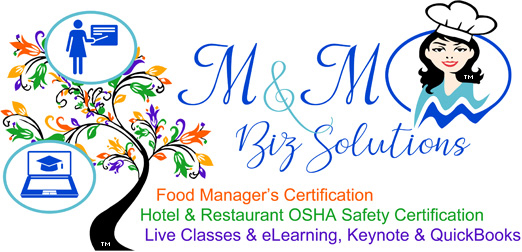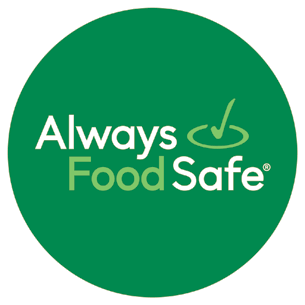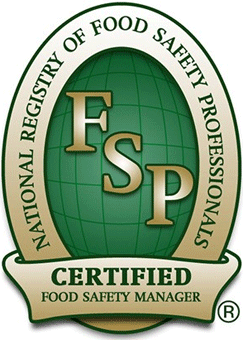Food Safety Classes
- Minnesota Initial Online Class
- Minnesota Refresher Live Webinar
- OHIO Manager - Level 2
- Wisconsin Small Operator
- Food Handlers
- Certified Food Safety Manager (CFSM) Courses
- Food Allergen Awareness Certification
- Hotel & Restaurant OSHA Safety
- Texas Live ServSaf. Classroom Classes
- OHIO PIC
- Continuing Education
Compare Exams
Food Manager Training
Services
Keynote & Training Topics
Blog
What To Do If A Restaurant Worker Gets COVID-19? by Chef Marshie Morgan

1 Jul 2020 17:00:00 Marshie


Even when a business follows all of the state and federal COVID-19 protocols, it is possible that someone who comes into that business will later be diagnosed with COVID-19. Restaurants are no exception, which is why restaurants continue to follow strict sanitation, social distancing, and health screening protocols.
States may not have issued requirements or recommendations to businesses who learn that an employee came into the business before being diagnosed with COVID-19, except to say that an employee with signs or symptoms of COVID-19 cannot work until the applicable quarantine period has passed.
Restaurants have a federal responsibility under OSHA to protect their employees and guests. The OSH Act Sec. 5 states:
(a) Each employer-
(1) Shall furnish to each of his employees employment and a place of employment which are free from recognized hazards that are causing or are likely to cause death or serious physical harm to his employees;
(2) Shall comply with occupational safety and health standards promulgated under this Act.
CDC has issued guidance on this question of what to do if a restaurant employee gets COVID-19. The following recommendations that all restaurants should follow from CDC guidelines until the State issue additional guidance.
CDC Guidelines
Ensure any employee with signs or symptoms of COVID-19 does not return to work until the State’s quarantine protocols have been met. This may mean you will have to implement new COVID-19 policies stating they may not come back to work until released from a medical doctor.
Identify anyone who had close contact with the sick employee at the restaurant (i.e., within 6 feet for at least 15 minutes), and notify them that they may have been exposed without revealing the name and identifying information of the sick employee. Keep the identifying information confidential per ADA and EEOC guidance. Any employees with signs or symptoms must quarantine as provided above. Employees who may have been exposed but are showing no signs or symptoms may continue working if the restaurant follows the enclosed CDC guidance.
Thoroughly clean and disinfect the facility. The CDC specifically says that, in most cases, businesses do not need to shut down because an employee contracts COVID-19. Instead, the CDC directs businesses to close off areas used by the sick employee and increase air circulation to those areas (for example by opening outside doors and windows and bringing in fans). The CDC further recommends that a business wait 24 hours, or as long as practical, and then clean and disinfect the sick employee’s work area and all frequently touched surfaces. If possible, M & M Biz Solutions recommends completing this step while the restaurant is closed at night to ensure a thorough cleaning and disinfecting.
M & M Biz Solutions also strongly urges the following to be done to help slow the spread:
1. Have someone by the door to open and close it for guests
2. Sanitize door handles on equipment, drawers, door handles, and chairs backs in the restaurant, the bathroom latches, faucets and knobs in the bathroom a minimum of every hour or more frequently.
3. Be mindful of taking credit cards from customers, you should wash your hands after you return the card.

Keep in mind due to the severity of the problem in the restaurant. The authorities, health department or city officials, could require you to shut down for a quarantine period.
Interim Guidance for Implementing Safety Practices for Critical Infrastructure Workers Who May Have Had Exposure to a Person with Suspected or Confirmed COVID-19 is available by CDC by going to the following link below. We all have to do our part to slow the spread. This means wearing a face covering and possibly having the guest wear a mask while entering the facility, walking to sit or bathroom and exiting the building.
In some jurisdictions across the U.S., they are putting the responsibility on the restaurant to follow this guideline and will impose up to $1000 dollar fines if the rule is not followed.
Cleaning and Disinfecting Guidance from the CDC and EPA.
CDC & EPA Recommendations – Cleaning and Disinfecting to Address COVID-19
General Guidance
• Ensure cleaning and disinfecting products are not past their expiration date.
• Follow the manufacturer’s instructions for application, proper ventilation, and safety measures. Many products require keeping the surface wet for several minutes to ensure germs are killed.
• Never mix household bleach with ammonia or any other cleanser.
• Wear disposable gloves and gowns for all tasks in the cleaning process, including handling trash. Remove gloves and gowns carefully to avoid contamination of the wearer and the surrounding area.
• Always wash your hands immediately after removing gloves. Wash your hands often with soap and water for 20 seconds.
Hard (Non-porous) Surfaces
• If surfaces are dirty, they should be cleaned using a detergent or soap and water prior to disinfection. • To disinfect, use an EPA-approved product for use against COVID-191 or a diluted household bleach solution if appropriate for the surface (5 tablespoons of bleach per gallon of room temperature water or 4 teaspoons of bleach per quart of room temperature water).
Soft (Porous) Surfaces
• Remove visible contamination if present and clean with appropriate cleaners indicated for use on these surfaces.
• After cleaning: If the items can be laundered, launder items in accordance with the manufacturer’s instructions using the warmest appropriate water setting for the items and then dry items completely. Otherwise, use an EPA-approved product for use against COVID-19 that is suitable for porous surfaces.
Electronics
• Remove visible contamination if present. Follow the manufacturer’s instructions for all cleaning and disinfecting products.
• Consider use of wipe able covers for electronics.
• If no manufacturer guidance is available, consider the use of alcohol-based wipes or sprays containing at least 70% alcohol to disinfect touch screens. Dry surfaces thoroughly to avoid pooling of liquids.
Linens, Clothing, and Other Items That Go in the Laundry
• To minimize the possibility of dispersing the virus through the air, do not shake dirty laundry.
• Wash items in accordance with the manufacturer’s instructions. If possible, launder items using the warmest appropriate water setting for the items and dry items completely. Dirty laundry that has been in contact with an ill person can be washed with other people’s items.
• Clean and disinfect hampers or other carts for transporting laundry according to guidance above for hard or soft surfaces.
List N: Disinfectants for Use Against SARS-CoV-2 (COVID-19)
All products on this list meet EPA’s criteria for use against SARS-CoV-2, the virus that causes COVID-19.

1 https://www.epa.gov/pesticide-registration/list-n-disinfectants-use-against-sars-cov-2-covid-19
Marshie Morgan is the author of Hotel and Restaurant Safety – for Employee and Managers. She teaches a two year certification program for the hospitality industry visit https://www.mmbizsolutions.com/osha-c61.htm to learn more about OSHA regulations affecting hospitality. Corporate discounts available.
Blog Search
Popular Articles
- Eva Barrios E. Sous Chef of Austin Country Club
- Gas Cylinders in Restaurants
- Chef Paola Chamberlain, C.C. a Private Chef and E. Chef at Waco Ale Company in Waco, TX
- Why is Hepatitis A Vaccines Mandatory for Food Handlers in Parts of U.S.?
- Cross-Contact vs. Cross-Contamination by Marshie Morgan
- Lance S. Cook CEC, CCA, WCEC, CFBE,FMP, CFSM at Hammock Dunes Club in Palm Coast, Florida
- Geno Bahena Chef de Cuisine at Blue Dalia Restaurant and Tequila Bar
- Chef Michele Brown, CEPC, EWMCS, Department Lead Instructor at Texas State Technical College
- Daniel Vercher E. Chef of Guckenheimer
- Michael Lottermoser with W Dallas Victory Hotel & Residences
























